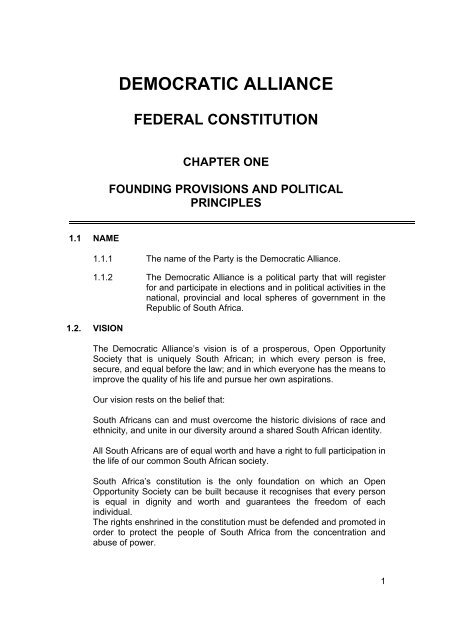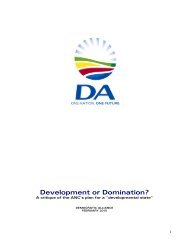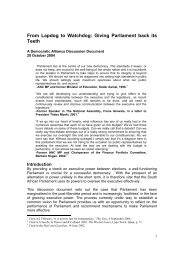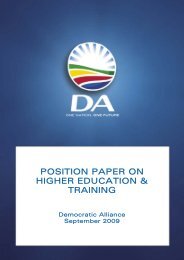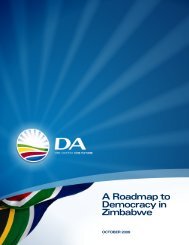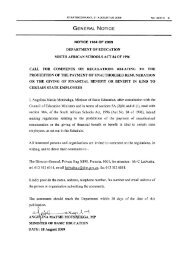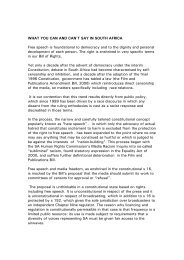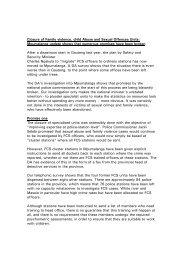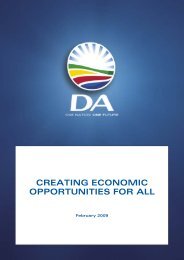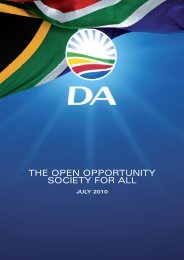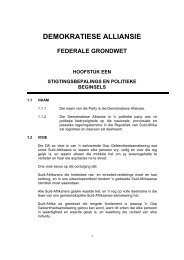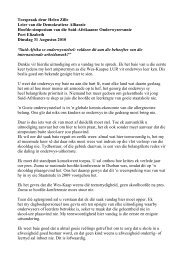DA CONSTITUTION.pdf - Democratic Alliance
DA CONSTITUTION.pdf - Democratic Alliance
DA CONSTITUTION.pdf - Democratic Alliance
You also want an ePaper? Increase the reach of your titles
YUMPU automatically turns print PDFs into web optimized ePapers that Google loves.
DEMOCRATIC ALLIANCE<br />
FEDERAL <strong>CONSTITUTION</strong><br />
CHAPTER ONE<br />
FOUNDING PROVISIONS AND POLITICAL<br />
PRINCIPLES<br />
1.1 NAME<br />
1.1.1 The name of the Party is the <strong>Democratic</strong> <strong>Alliance</strong>.<br />
1.1.2 The <strong>Democratic</strong> <strong>Alliance</strong> is a political party that will register<br />
for and participate in elections and in political activities in the<br />
national, provincial and local spheres of government in the<br />
Republic of South Africa.<br />
1.2. VISION<br />
The <strong>Democratic</strong> <strong>Alliance</strong>’s vision is of a prosperous, Open Opportunity<br />
Society that is uniquely South African; in which every person is free,<br />
secure, and equal before the law; and in which everyone has the means to<br />
improve the quality of his life and pursue her own aspirations.<br />
Our vision rests on the belief that:<br />
South Africans can and must overcome the historic divisions of race and<br />
ethnicity, and unite in our diversity around a shared South African identity.<br />
All South Africans are of equal worth and have a right to full participation in<br />
the life of our common South African society.<br />
South Africa’s constitution is the only foundation on which an Open<br />
Opportunity Society can be built because it recognises that every person<br />
is equal in dignity and worth and guarantees the freedom of each<br />
individual.<br />
The rights enshrined in the constitution must be defended and promoted in<br />
order to protect the people of South Africa from the concentration and<br />
abuse of power.<br />
1
An independent and effective opposition that is loyal to the constitutional<br />
order is essential to the promotion and preservation of democracy and<br />
freedom in our country.<br />
An independent and vibrant civil society is essential to the preservation of<br />
an open society, because it acts as a bulwark against any attempt by the<br />
state or the ruling party to impose a hegemony of thought and truth over<br />
society.<br />
The dignity of every person and the freedoms enshrined in the constitution<br />
cannot fully be realised unless everyone has the means to pursue his own<br />
happiness and improve the quality of her life. Consequently, the creation<br />
of meaningful opportunity must be central to the programme of<br />
government at every level.<br />
The force behind the growing prosperity of any society is a socially and<br />
environmentally responsible free enterprise economy driven by choices,<br />
risks and hard work. Without the growth in prosperity created through the<br />
exercise of the market economy there can be no opportunity, freedom<br />
loses it purpose and choices become increasingly limited.<br />
No one must be left behind in an opportunity society. The government<br />
must therefore provide access to education and training, and promote the<br />
progressive realisation of access to social security, housing and<br />
healthcare for those who through no fault of their own are unable to<br />
provide for themselves<br />
1.3 PRINCIPLES<br />
The vision of the <strong>Democratic</strong> <strong>Alliance</strong> is grounded on the defence,<br />
promotion and extension of the following principles:<br />
1.3.1 the fundamental rights and freedoms of every person -<br />
including the right to freedom of conscience, speech,<br />
association, and movement;<br />
1.3.2 the rejection of unfair discrimination on any grounds;<br />
1.3.3 the supremacy of the South African constitution and the rule<br />
of law;<br />
1.3.4 the language, cultural and religious rights of individuals and<br />
the communities they create through free association;<br />
1.3.5 equality before the law;<br />
1.3.6 the separation of legislative, executive and judicial power.<br />
2
1.3.7 a judiciary that is independent;<br />
1.3.8 elections that are regular, free and fair;<br />
1.3.9 representative and accountable government elected on the<br />
basis of universal adult suffrage;<br />
1.3.10 the devolution of power to locate government as close as<br />
possible to the people;<br />
1.3.11 the clear division between the ruling party and the state;<br />
1.3.12 respect for the right or a vibrant civil society and a free media<br />
to function independently;<br />
1.3.13 the rejection of violence and intimidation as a political<br />
instrument;<br />
1.3.14 the right of all people to private ownership and to participate<br />
freely in the market economy;<br />
1.3.15 the progressive realisation of access to housing, health<br />
services and social security for all people who are unable to<br />
help themselves;<br />
1.3.16 the protection and conservation of the environment;<br />
1.3.17 the right of all people to protection by the state from crime<br />
and violence;<br />
1.3.18 access to education and training.<br />
1.4 MISSION STATEMENT<br />
As a proud South African loyal to the constitution, I commit myself to serve<br />
with integrity the people of my country by building a party that is home to<br />
all South Africans, makes a visible difference to the lives of our people and<br />
promotes an Open Opportunity Society in which every person is free,<br />
secure, equal before the law and has the means to improve the quality of<br />
his or her life.<br />
1.5. PROGRAMME OF ACTION<br />
3
1.5.1 The Party will promote its growth in all communities with the<br />
intention of realising its vision and advancing its principles<br />
either as government or opposition in all spheres.<br />
1.5.2 The programme of action must include provisions aiming at,<br />
but not be limited to, the following:<br />
1.5.2.1 serving the needs of the people of South Africa<br />
through the structures and resources of the<br />
Party;<br />
1.5.2.2 endeavouring to gain control of governments in<br />
all spheres of government;<br />
1.5.2.3 being an effective government when in power;<br />
1.5.2.4 being an effective opposition when not in<br />
government;<br />
1.5.2.5 holding its public representatives to account.<br />
1.5.3 The Party must seek to co-operate with those on the African<br />
continent who share its passion for freedom, dignity, equality<br />
and democracy<br />
1.6 LEGAL PERSONALITY AND POWERS<br />
1.6.1 The Party is a body corporate with perpetual succession.<br />
1.6.2 The Party is capable of suing and being sued in its own<br />
name and it may own, purchase, sell, hire, lease, mortgage,<br />
pledge or in any other way acquire, alienate or deal with<br />
movable and immovable property and may perform all legal<br />
activities authorized by this Constitution and by the<br />
Provincial Constitutions as well as legal activities normally<br />
associated with a body corporate.<br />
1.6.3 The Party shall only be legally bound in the exercise of its<br />
competencies set out in clause 1.6.2 by a person or persons<br />
authorized by a resolution of the competent formation of the<br />
Party: Provided that<br />
1.6.3.1 a Branch or Branch Committee and a<br />
Constituency or a Constituency Committee<br />
shall be competent to act on behalf of and<br />
legally bind the Party only if such competency<br />
is granted by the relevant Provincial<br />
Constitution and only if such Branch or Branch<br />
4
Committee or Constituency or Constituency<br />
Committee is authorized to act in writing by the<br />
relevant Provincial or Regional Executive;<br />
1.6.3.2 a Provincial Executive or Regional Executive<br />
shall be competent to act on behalf of and<br />
legally bind the Party but only to the extent<br />
necessary to exercise the functions and<br />
achieve the goals of the Party at provincial or<br />
regional level respectively, subject however to<br />
budgetary constraints and financial limitations<br />
which the Federal Executive may impose from<br />
time to time;<br />
1.6.3.3 the Federal Executive represented by the<br />
Chairperson of the Federal Council may act on<br />
behalf of and legally bind the Party in all<br />
matters;<br />
1.6.3.4 no other member or formation of the Party than<br />
such as set out in (1), (2) and (3) above may<br />
act on behalf of and legally bind the Party.<br />
1.6.4 The Chairperson of the Federal Executive or someone<br />
authorized by him or her represents the Party in all legal<br />
proceedings by or against the Party.<br />
1.6.5 All monies received and collected in the name of the Party<br />
vest in the Party itself.<br />
1.6.6 Income and assets of the Party are not distributable to<br />
members or office bearers except as reasonable<br />
compensation for services rendered.<br />
CHAPTER TWO<br />
5
GENERAL ORGANISATIONAL PRINCIPLES<br />
OF THE PARTY<br />
2.1 GENERAL STRUCTURE OF THE PARTY<br />
2.1.1 The Party consists of members who are organised in and<br />
function democratically through the organisational formations<br />
of the Party.<br />
2.1.2 The organisational formations of the Party are set out in this<br />
Constitution, and consist of formations at federal, provincial,<br />
and local level.<br />
2.1.3 The formations may also include formations at regional and<br />
sub-regional level depending upon the circumstances of<br />
each province and the provisions of the provincial<br />
constitution.<br />
2.1.4 At local level the Party must establish branches with<br />
democratically elected branch committees, and strive to<br />
establish a branch in every ward within the Republic of South<br />
Africa.<br />
2.1.5 Branches are the basic organisational units of the Party and<br />
every member of the Party must be a member of a Branch<br />
and must exercise his or her rights and privileges as a<br />
member through his or her Branch and its elected<br />
representatives and delegates.<br />
2.1.6 The Party must establish constituencies as organisational<br />
units above the branches. Such constituencies must be<br />
delimited taking local circumstances into account and must<br />
cover all of the wards within the geographical area<br />
concerned.<br />
2.1.7 Where constituencies have been delimited and allocated by<br />
the regional or provincial structures concerned after<br />
consultation with the branches in the area, a democratically<br />
elected constituency committee assumes responsibilities in<br />
terms of the provincial constitution.<br />
2.1.8 At provincial level the Party must establish a provincial<br />
congress for every province in the Republic of South Africa .<br />
6
2.1.9 Provincial Congresses may establish Provincial Councils as<br />
set out in their Provincial Constitutions that fairly reflect the<br />
profile of the composition of their Congresses.<br />
2.1.10 Provincial Congresses must establish a Provincial Executive<br />
and other committees as may be provided for in their<br />
Provincial Constitutions.<br />
2.1.11 At national level the Party must establish a Federal<br />
Congress and the other formations provided for in this<br />
constitution.<br />
2.1.12 The Party is assisted and supported by the <strong>Democratic</strong><br />
<strong>Alliance</strong> Women’s Network, the <strong>Democratic</strong> <strong>Alliance</strong> Youth,<br />
and other bodies which function in terms of this Constitution<br />
and in terms of Rules or Constitutions approved by the<br />
Federal Council.<br />
2.1.13 The Federal Congress is the highest level at which the<br />
democratically expressed will of the members is stated and<br />
the Federal Congress is thus the highest authority in respect<br />
of all matters in the Party, subject to the provisions of this<br />
constitution.<br />
2.1.14 Formations in the Party have the authority, powers and<br />
functions set out in this constitution and in the Provincial<br />
Constitutions.<br />
2.2. NOMINATION OF CANDI<strong>DA</strong>TES<br />
2.2.1 The Federal Council must adopt nomination regulations for<br />
the selection of candidates to public representative bodies in<br />
all spheres of government.<br />
2.2.2 Those regulations must make provision for provincial and<br />
local variations to suit the circumstances of the provinces.<br />
Detailed written grounds must be supplied motivating<br />
variations by the province and/or local formation concerned.<br />
2.2.3 Regulations for the nomination and selection of candidates<br />
for the National Assembly must provide for provincial lists<br />
only.<br />
2.3 VOTING<br />
7
2.3.1 Subject to the provisions of this constitution, voting at<br />
meetings of all bodies of the Party is by a show of hands,<br />
unless secret ballot is required by the person presiding or by<br />
one-tenth of the members present;<br />
2.3.2 Decisions at all meetings are taken by a majority of members<br />
present and voting, provided that:<br />
2.3.2.1 a teleconference shall only be regarded as a<br />
meeting if a quorum of the participants is<br />
present and if notice of such a teleconference<br />
has been given to the members; and further<br />
provided that, where a secret ballot is<br />
requested, voting shall take place at a special<br />
meeting called thereafter;<br />
2.3.2.2 the Federal Council may, in exceptional<br />
circumstances, allow distance voting by a<br />
member not present at the relevant meeting in<br />
cases of meetings of Federal structures of the<br />
Party, but who has heard the deliberations;<br />
and<br />
2.3.2.3 the presiding officer at a meeting has a casting<br />
as well as a deliberative vote.<br />
2.3.3 The membership of the Party is audited on 31 May or such<br />
other date as the Federal Council from time to time decides.<br />
A member of the Party who is a member on the audit date is<br />
entitled to vote at all meetings of the Party subsequent to<br />
that date until the next audit date. Members who join the<br />
Party or renew their membership after the audit date, shall<br />
be entitled to vote at all meetings 30 days after the date of<br />
joining or renewal: provided that the Provincial and Regional<br />
Executive may determine an appropriate cut-off date for<br />
voting by new members at inaugural general meetings.<br />
2.3.4 All elections to office within the Party involving the election of<br />
more than one person to an office must be by a proportional<br />
voting system approved by the Federal Council.<br />
2.4 POLICY<br />
2.4.1 The supreme policy-making body of the Party is the Federal<br />
Congress in session. Proposals affecting the Vision or the<br />
Principles of the Party as contained in this constitution shall<br />
not be debated or decided upon unless four weeks prior<br />
written notice has been given to delegates to Congress, or in<br />
8
the event of such notice not having been given, by a fourfifths<br />
majority vote of all those present and voting, the<br />
Federal Congress agrees to debate and decide upon such<br />
proposals.<br />
2.4.2 When the Federal Congress is not in session, the Federal<br />
Council may formulate policy in matters where no policy has<br />
been stated or where the stated policy is not clear or needs<br />
to be specifically applied, expressed, amended or expanded<br />
in accordance with the Vision and the Principles of the Party.<br />
2.4.3 When the Federal Congress and Federal Council are not in<br />
session, the Leader and the Caucuses have policy functions<br />
that are dealt with elsewhere in this constitution.<br />
2.4.4 Provincial Congresses of the Party may adopt policy on<br />
matters that are within the competence of the provinces in<br />
terms of the Constitution of South Africa provided that they<br />
must not contradict the Vision and the Principles of the Party<br />
or a policy decision of the Federal Congress or Federal<br />
Council.<br />
2.5 STAN<strong>DA</strong>RDS OF CONDUCT OF PARTY MEMBERS<br />
2.5.1 All Party members are subject to the discipline of the Party<br />
and submit to the provisions of this constitution in regard to<br />
rules on conduct and to the disciplinary procedures set out in<br />
Chapter 9.<br />
2.5.2 All Party members submit to the right of the Party, subject to<br />
2.5.5, to remove any public representative from office on the<br />
grounds of incompetence, inefficiency or incapacity.<br />
2.5.3 Any member, including a public representative, is guilty of<br />
misconduct if he or she:<br />
2.5.3.1 publicly opposes the Party’s principles or<br />
repeatedly opposes published party policies,<br />
except in or through the appropriate Party<br />
structures;<br />
2.5.3.2 deliberately acts in a way which impacts<br />
negatively on the image or performance of the<br />
Party;<br />
2.5.3.3 acts in any manner whatsoever which results in<br />
him or her being found guilty of a serious<br />
criminal offence by a court of first instance;<br />
9
2.5.3.4 fails to carry out his or her duties or<br />
responsibilities according to standards set by<br />
the Federal Council of the Party or of the<br />
relevant Provincial or Regional Council as<br />
embodied in the applicable Code of Conduct,<br />
or to standards required by any statutory rules<br />
of conduct required by the public office he or<br />
she holds;<br />
2.5.3.5 brings the good name of the Party into<br />
disrepute or harms the interests of the Party;<br />
2.5.3.6 acts in a manner that is unreasonable and<br />
detrimental to internal co-operation within the<br />
Party;<br />
2.5.3.7 unreasonably fails to comply with or rejects<br />
decisions of the official formations of the Party;<br />
2.5.3.8 submits or attempts to submit false<br />
membership forms or commits or attempts to<br />
commit membership fraud in any way;<br />
2.5.3.9 contravenes any of the explicit Party decisions<br />
or regulations for the appropriation of Party<br />
finances;<br />
2.5.3.10 collects money on behalf of or in the name of<br />
the Party or any of its structures without<br />
depositing such money in a bank account<br />
opened and operated in terms of procedures<br />
approved by the Federal Finance Committee<br />
and/or operates a bank account in which Party<br />
money is deposited without the approval of the<br />
Federal Finance Committee or a structure of<br />
the Party authorized by it;<br />
2.5.3.11 in any election for office mobilizes or attempts<br />
to mobilize discrimination against or opposition<br />
to any person on the grounds of race, gender,<br />
sex, pregnancy, marital status, ethnic or social<br />
origin, colour, sexual orientation, age, disability,<br />
religion, conscience, belief, culture, language<br />
or birth.<br />
2.5.4 A public representative may be removed from office on the<br />
grounds of incompetence, inefficiency or incapacity, but only<br />
in terms of the procedures laid down in Chapter 9.<br />
10
2.5.5 Subject to 3.5, disciplinary action against any public<br />
representative or any member which results in that<br />
member’s membership being terminated or his or her<br />
privileges being curtailed, can only be taken in terms of<br />
Chapter 9.<br />
CHAPTER 3<br />
11
MEMBERSHIP AND BRANCHES<br />
3.1 MEMBERSHIP<br />
3.1.1 Every person wishing to become a member of the<br />
<strong>Democratic</strong> <strong>Alliance</strong> must:<br />
3.1.1.1 be 16 years of age or older, provided that<br />
persons younger than 16 may be enrolled as<br />
Junior Members if the Constitution of the<br />
<strong>Democratic</strong> <strong>Alliance</strong> Youth provides for this<br />
category of member;<br />
3.1.1.2 be a citizen or a permanent resident of South<br />
Africa;<br />
3.1.1.3 subscribe to the Vision, the Principles, the<br />
Programme of Action and the Mission<br />
Statement of the Party;<br />
3.1.1.4 agree to abide by the constitution of the Party;<br />
3.1.1.5 apply in writing to become a member of the<br />
Party, by signing the prescribed membership<br />
application form;<br />
3.1.1.6 personally pay the annual membership<br />
subscription and comply with any other<br />
conditions set by the Federal Executive. What<br />
constitutes personal payment will be regulated<br />
by the Federal Executive from time to time.<br />
3.1.2 Membership takes effect when a person complies with the<br />
requirements for membership as set out in clause 3.1.1.<br />
3.1.3 A person may enrol as a member at any time during the year<br />
subject thereto that<br />
3.1.3.1 a member who enrolled on or before 30<br />
September of any year, remains a member<br />
until 31 May of the next year; and<br />
3.1.3.2 a member who enrolled on or after 1 October<br />
of any year will be regarded as having enrolled<br />
in the next year and he or she remains a<br />
12
member through that next year and until 31<br />
May of the year thereafter.<br />
3.1.4 Any member who fails to renew his or her membership on or<br />
before the due date resumes membership only from the date<br />
upon which he or she pays the annual membership<br />
subscription and is subject to the 30 day requirement<br />
referred to in clause 2.3.3.<br />
3.1.5 A donor to the Party whose donation in that year exceeds<br />
the annual membership subscription, and a public<br />
representative whose compulsory contribution to the Party in<br />
that year exceeds the annual membership subscription, need<br />
not pay the annual subscription.<br />
3.1.6 The Party may provide for life membership of the Party as an<br />
honour given at the discretion of the Federal Council.<br />
3.2 REFUSAL OF MEMBERSHIP<br />
3.2.1 The Executive of a Constituency or a Regional or Provincial<br />
Executive may refuse to accept the membership of any<br />
person other than a public representative of the Party who<br />
joined the Party in accordance with 3.1.1 within 15 days of<br />
the payment of the membership subscription by such a<br />
person, in the case of a constituency refusal, 30 days in the<br />
case of a regional refusal and 60 days in the case of a<br />
Provincial Executive refusal.<br />
3.2.2 A person whose membership was refused in terms of 3.2.1,<br />
may appeal that decision to the Provincial Executive, or, if<br />
the decision was taken by the Provincial Executive, to the<br />
Federal Executive. The decision of the Provincial or Federal<br />
Executive, as the case may be, is final.<br />
3.2.3 Public representatives from other parties may only be<br />
accepted as members of the Party with the prior approval of<br />
the Federal Executive or a person designated by the Federal<br />
Executive, after consultation with the Provincial or Regional<br />
Executive concerned: provided that the Branch<br />
Executive must also be consulted in respect of a local<br />
government representative.<br />
3.3 MEMBERSHIP SUBSCRIPTIONS<br />
13
3.3.1 The Federal Council determines from time to time the<br />
minimum membership subscription of the Party and the date<br />
for payment. That minimum will be uniform for all members.<br />
3.3.2 A Provincial Council or Provincial Executive may request an<br />
additional voluntary surcharge from members living in that<br />
province.<br />
3.3.3 A branch may request additional voluntary annual<br />
subscriptions over and above the membership subscription<br />
prescribed by the Federal Council or Provincial Council or<br />
Provincial Executive.<br />
3.3.4 A member may pay the membership fee for his or her<br />
spouse(s), partner, child, parent or dependent(s) living at the<br />
same address. Sponsored membership in any form or for<br />
any person or class of persons other than in terms of this<br />
clause or of clause 3.1.1.6 is not allowed.<br />
3.4 DUAL MEMBERSHIP<br />
A member or category of members of the Party may also be a member or<br />
members of another party or parties approved by the Federal Council for<br />
the period and on conditions determined by the Federal Council.<br />
3.5 CESSATION OF MEMBERSHIP<br />
3.5.1 A member ceases to be a member of the Party when he or<br />
she:<br />
3.5.1.1 submits his or her written resignation from the<br />
Party;<br />
3.5.1.2 becomes or remains a member of another<br />
party other than one approved under this<br />
constitution;<br />
3.5.1.3 declares his or her resignation or intention to<br />
resign from the Party or intention to join<br />
another party;<br />
3.5.1.4 fails to renew his or her membership on or<br />
before the date stipulated in clause 3.1.3;<br />
3.5.1.5 canvasses other Party members to resign from<br />
the Party;<br />
14
3.5.1.6 canvasses other Party members to join or<br />
support another Party;<br />
3.5.1.7 stands or accepts nomination against an official<br />
candidate of the Party in any public election;<br />
3.5.1.8 is found guilty of any offence listed in Schedule<br />
6 or 7 of the Criminal Procedure Act;<br />
3.5.1.9 is in default with the payment of any<br />
compulsory public representative contribution<br />
for a period of 2 (two) months after having<br />
been notified in writing that he or she is in<br />
arrears and fails to make satisfactory<br />
arrangements or fails to comply with such<br />
arrangements for payment of the arrears.<br />
3.5.2 A member, who ceases to be a member of the Party, loses<br />
all privileges of Party membership and, if that member is a<br />
public representative, he or she also loses the office which<br />
he or she occupies by virtue of his or her membership, with<br />
immediate effect.<br />
3.5.3 A statement under oath or affirmation by the member’s<br />
Branch, Regional or Provincial Chairperson supported by at<br />
least one further statement by a member of the relevant<br />
executive that such member’s membership has ceased in<br />
terms of clause 3.5.1, shall be sufficient grounds for the<br />
Provincial Executive to take the steps envisaged in clause<br />
3.7.2<br />
3.6 TERMINATION OR SUSPENSION OF MEMBERSHIP<br />
3.6.1 Apart from clause 3.5, the membership of any member,<br />
including that of a public representative may only be<br />
terminated by a provincial executive and only after an<br />
enquiry in terms of Chapter 9.<br />
3.6.2 The Party membership of a public representative who is<br />
removed from office in terms of clause 2.5.4 is not affected<br />
by that removal.<br />
3.6.3 A Provincial Executive or the Federal Executive may<br />
suspend a Party member from any or all of the activities of<br />
the Party, pending the institution of a disciplinary enquiry in<br />
terms of Chapter 9: provided that a caucus may suspend a<br />
caucus member from all or any caucus activities, pending<br />
such an enquiry.<br />
15
3.7 ONLY MEMBERS CAN SERVE<br />
3.7.1 Only Party members can serve on the representative and<br />
other structures of the Party and be public representatives of<br />
the Party.<br />
3.7.2 If the membership of a public representative is terminated in<br />
terms of 3.6.1 or if a public representative ceases to be a<br />
member of the Party by virtue of 3.5.1, the relevant<br />
Provincial Executive or Regional Executive, as the case may<br />
be, must notify the relevant authorities of the vacancy which<br />
has arisen.<br />
3.8 BRANCHES<br />
3.8.1 The basic organisational units of the Party are the branches.<br />
The Party will strive to establish and maintain a branch or<br />
branches for every local government ward in South Africa.<br />
3.8.2 Branches are established to manage and direct the affairs of<br />
the Party, to communicate the principles and policy of the<br />
Party to the public, to mobilize the public in support of the<br />
programme of action of the Party, to participate in the<br />
process of democratic selection of candidates for the Party<br />
and to serve as the vehicle for the articulation of the interests<br />
of members of the Party and voters in their areas of<br />
jurisdiction.<br />
3.9 MEMBERSHIP OF BRANCHES<br />
3.9.1 Members of the Party belong to branches and exercise their<br />
voting rights as members in branches, or through<br />
representatives elected by branches.<br />
3.9.2 Members belong to the branch established for the ward or<br />
voting district within which they live. Where no branch has<br />
yet been established in a ward, the Provincial Executive, or<br />
Regional Executive where one has been established, must<br />
allocate the members, in consultation with them, to the<br />
closest branch where it is practical and functional for them to<br />
be included as members.<br />
3.9.3 A member of the Party can be a member of only one branch.<br />
Public representatives may attend and speak at all branches<br />
in the area of jurisdiction which they represent or which has<br />
been allocated to them, but they are entitled to vote only in<br />
the branch of which they are members.<br />
16
3.9.4 A public representative may join any branch within the<br />
constituency or ward for which he or she is responsible, even<br />
if he or she does not live within that area, provided that he or<br />
she must advise the relevant Provincial or Regional<br />
Secretary of his or her choice.<br />
3.9.5 A member may apply to the Provincial Executive to join a<br />
branch other than the branch within the area in which he or<br />
she lives. The Provincial Executive shall approve the<br />
application only on good cause shown.<br />
3.10 AREA OF JURISDICTION OF BRANCHES<br />
3.10.1 The area of jurisdiction of a branch must not be smaller than<br />
a voting district. The purpose of forming more than one<br />
branch per ward is for the promotion of the organizational<br />
objectives of the Party or for the convenience of the<br />
members of the Party in the ward and does not entitle the<br />
branches to more or additional representation in higher<br />
structures than there would have been had there been only<br />
one branch in the ward.<br />
3.10.2 The area of jurisdiction of a branch is:<br />
3.10.2.1 the entire municipal ward if there is only one<br />
branch in the ward,<br />
3.10.2.2 as many voting districts as the Provincial or<br />
Regional Executive may direct if there is more<br />
than one branch in a ward;<br />
3.10.2.3 more than one ward if the Provincial or<br />
Regional Executive deems it not possible to<br />
establish and maintain a branch for each ward<br />
in the immediate future.<br />
3.11 REPRESENTATION OF BRANCHES<br />
3.11.1 Where there is more than one branch in a ward, the<br />
representation to other structures of the party will be<br />
allocated between the branches within the ward<br />
proportionately on the basis of membership numbers in each<br />
of the branches as to 50% of the representation and the<br />
remaining 50% on the basis of the most recent election<br />
results in the voting district or districts concerned.<br />
3.11.2 If the branches in a ward are jointly entitled to fewer<br />
representatives to higher bodies than the number of<br />
17
anches, or if that representation must be shared between<br />
branches, the representatives will be elected using a<br />
proportional voting system approved by the Federal Council<br />
by delegates from the branches involved at a combined<br />
branch meeting held at a date time and venue approved by<br />
the Constituency Committee. Each branch will be<br />
represented at that meeting by a number of delegates<br />
determined by the Constituency Committee on the basis of<br />
the membership of each branch.<br />
3.11.3 The entitlement of a branch to representation to other<br />
structures of the Party is determined by the status of that<br />
branch as at the last audit date as provided in clause 2.3.3.<br />
3.12 BRANCHES CROSSING PROVINCIAL BOUN<strong>DA</strong>RIES<br />
3.12.1 Where a municipality has been established across provincial<br />
boundaries, and a ward within the municipality falls within<br />
two provinces, branches comprising a voting district or<br />
districts may be established within each part of the ward<br />
within each province.<br />
3.12.2 In the event of only one branch being established in a cross<br />
boundary ward the Provincial Executives must enter into an<br />
agreement and allocate the branch for management and<br />
representation purposes to an appropriate Party structure in<br />
one of the provinces.<br />
3.12.3 Two or more branches falling within different provinces may,<br />
on account of their geographical situation and common<br />
interests, with the approval of the Provincial Executives,<br />
constitute a liaison committee to deal with common interests.<br />
3.13 FORMATION OF BRANCHES<br />
3.13.1 A branch may only be formed with the prior approval of the<br />
body vested with this responsibility in the Provincial<br />
Constitution and the Constituency Committee, and the<br />
branch area of jurisdiction must be determined at the same<br />
time. Approval for the formation of a branch must not be<br />
unreasonably withheld.<br />
3.13.2 A branch may only be formed if the Provincial Executive<br />
certifies that there are at least 25 members within the area of<br />
jurisdiction of the branch.<br />
3.13.3 A branch ceases to exist if its members drop below 25 as<br />
certified by the membership audit, or if a general meeting of<br />
the branch, of which notice was given to all members of the<br />
18
3.14 BRANCH MEETINGS<br />
branch, decides to dissolve the branch, or if the branch fails<br />
to hold an annual general meeting. The members of the<br />
branch must then be transferred to an adjoining branch as<br />
determined by the Provincial Executive.<br />
3.14.1 A Provincial Executive or where there is one, a Regional<br />
Executive, or the Constituency Committee as the case may<br />
be, may require a Branch Executive, which has failed to<br />
carry out its mandate in terms of the constitution, to convene<br />
a meeting of members for the purpose of electing a new<br />
Branch Executive and, if it fails to do so within 30 days, the<br />
Provincial or Regional Executive may itself convene such a<br />
meeting.<br />
3.14.2 When a new branch is about to be formed or an existing<br />
branch is to hold an annual general meeting a notice<br />
indicating the date, time and venue of the meeting and the<br />
nature of the business to be transacted must be given to all<br />
of the members of the branch resident in the ward, to all<br />
public representatives of the Party responsible for the area<br />
and to the office of the Provincial or Regional Executive as<br />
the case may be. At least 14 days notice is required before<br />
such a meeting may be held.<br />
3.14.3 The quorum for the holding of an inaugural meeting and for<br />
an annual general meeting will in all cases be thirteen (13)<br />
members.<br />
3.14.4 The presiding officer at all inaugural and annual general<br />
meetings of branches must be a person designated by the<br />
Provincial or Regional Executive, as the case may be.<br />
3.14.5 The Chairperson of a Branch Executive must call a general<br />
meeting of the branch within twenty one days if one-fifth of<br />
the members of the branch so request in writing.<br />
3.15 BRANCH EXECUTIVES<br />
Branch Executives:<br />
3.15.1 must meet on a regular basis, but not less than twice<br />
annually, at times, dates and venues determined by the<br />
Chairperson;<br />
3.15.2 in general manage and guide the activities of the Party within<br />
their area of jurisdiction and ensure that the programme of<br />
action of the Party is implemented as far as possible;<br />
19
3.15.3 give effect to the decisions of higher formations of the Party;<br />
3.15.4 report to the Constituency Committee and, when so required,<br />
to other higher formations of the Party on activities and on<br />
local ideas and opinion;<br />
3.15.5 assist the public representatives of the Party in implementing<br />
the policy and the programme of action;<br />
3.15.6 communicate with members of the Party and the broader<br />
public in order to mobilize support for the Party;<br />
3.15.7 subject to the decisions and guidelines of higher formations,<br />
open offices, acquire equipment, employ staff and open<br />
banking accounts.<br />
3.16 CONSTITUENCIES<br />
3.16.1 A Provincial Executive must, in consultation with the Chief<br />
Executive Officer of the Party and after due consultation with<br />
the Party structures and the incumbent Members of<br />
Parliament and Members of the relevant Provincial<br />
Legislature, demarcate constituency boundaries: provided<br />
that a Provincial Constitution may place the authority to<br />
demarcate with another Party structure.<br />
3.16.2 A constituency must be an area capable of being<br />
administered as a unit and must consist of one or more<br />
adjacent local municipalities, or, in the case of metropolitan<br />
areas or large municipalities, of adjacent wards, forming one<br />
geographical area.<br />
3.16.3 Every constituency must have a Constituency Committee<br />
consisting of at least one representative from each branch<br />
within the constituency area.<br />
3.16.4 The duly constituted Constituency Committee may elect from<br />
amongst its members a Constituency Executive.<br />
3.16.5 The public representative allocated to the constituency in<br />
terms of clause 3.18 as well as all councillors representing<br />
ward in the constituency or who are list councillors but have<br />
been allocated to a ward in the constituency, are<br />
automatically members of the Constituency Committee.<br />
3.17 POWER AND FUNCTIONS OF THE CONSTITUENCY COMMITTEES<br />
The Constituency Committee<br />
20
3.17.1 participates in drafting an annual programme for the<br />
constituency and all its branches; and<br />
3.17.2 assists the public representatives and management of the<br />
Party in implementing the policies and the programme of<br />
action of the Party.<br />
3.18 CONSTITUENCY REPRESENTATIVES<br />
3.18.1 The Provincial Executive must, after having demarcated<br />
constituencies in accordance with clause 3.16.1, allocate<br />
one Member of Parliament or one Member of the Provincial<br />
Legislature, to a constituency as the Constituency<br />
Representative.<br />
3.18.2 The Constituency Representative is the political leader in<br />
that constituency and is directly responsible to the Provincial<br />
and Federal leadership for the proper political functioning of<br />
the constituency and the branches within the constituency.<br />
CHAPTER 4<br />
21
PROVINCES AND PROVINCIAL <strong>CONSTITUTION</strong>S<br />
4.1 Each province must have a provincial constitution that must provide for:<br />
4.1.1 a Provincial Congress,<br />
4.1.2 a Provincial Council,<br />
4.1.3 a Provincial Executive,<br />
4.1.4 Constituency Committees and<br />
4.1.5 Branch Committees<br />
with all the appropriate and relevant provisions relating to those bodies:<br />
provided that a Provincial Constitution may make provision for Regions<br />
and Regional Councils as institutional structures between Constituencies<br />
and Congress and may in such instance omit a Provincial Council.<br />
4.2 Branches must be represented at Constituency Committee level and<br />
Constituency Committees at Provincial Council level: provided that where<br />
Regional Councils are created, Constituency Committees must be<br />
represented at Regional Council level and Regional Councils at Provincial<br />
Council level.<br />
4.3 Provincial constitutions are intended to suit local conditions that may differ<br />
from province to province, and may therefore with the approval of the<br />
Federal Council deviate from this constitution to the extent that provision is<br />
made herein for such departure.<br />
4.4 Any departure in a Provincial Constitution from the provisions of this<br />
constitution must be in clear and concise terms.<br />
4.5 A Province must within six months after the acceptance of the<br />
amendments to Chapter 3 and Chapter 4 at Federal Congress in May<br />
2007, amend their Provincial Constitutions to implement the changes:<br />
provided that if no Provincial Congress takes place within that period, the<br />
province must implement the changes by way of rules adopted by the<br />
Provincial Council or Provincial Executive, which rules shall have the<br />
status and effect of constitutional imperatives.<br />
4.6 All provincial constitutions or amendments thereof must be submitted to<br />
the Federal Council for approval immediately after the adoption thereof, or<br />
such further limited period as the Federal Council may permit.<br />
4.7 BRANCHES AND CONSTITUENCIES<br />
22
The provisions of Chapter 3 of this constitution in regard to branches and<br />
constituencies will apply in all respects to all provinces, unless the Federal<br />
Council approves of a deviation that conforms to clauses 4.1 to 4.4 above<br />
and is clearly set out in a Provincial Constitution.<br />
4.8 REGIONAL STRUCTURE<br />
4.8.1 If a Provincial Constitution makes provision for regions and<br />
Regional Councils or other regional structures, that<br />
constitution must clearly set out the powers and duties of<br />
such structures and how such structures are composed in<br />
order to comply with clauses 4.1 to 4.4 above.<br />
4.8.2 The establishment of regional structures is subject to the<br />
general principles referred to in clauses 4.2 and 4.3 and a<br />
Provincial Constitution must give effect thereto.<br />
4.8.3 Any amendments to a Provincial Constitution only takes<br />
effect upon the approval of that amendment by the Federal<br />
Council.<br />
4.9 CONGRESS, PROVINCIAL COUNCIL AND PROVINCIAL EXECUTIVE<br />
4.9.1 a Provincial Congress, Provincial Council and Provincial<br />
Executive must be composed such as to fairly represent the<br />
members of the Party in that province and subject to the<br />
provisions of the Federal Constitution in regard to<br />
representation from lower to higher formations of the Party.<br />
4.9.2 The Provincial Constitution must clearly set out how its<br />
provincial delegates to the Federal Council are determined.<br />
4.9.3 A Provincial Council and Provincial Executive must:<br />
4.9.3.1 ensure that all structures of the Party in the<br />
province are regularly elected;<br />
4.9.3.2 ensure that all structures function properly and<br />
in terms of the requirements of the Federal and<br />
Provincial Constitutions;<br />
4.9.3.3 prescribe systems that will help to ensure<br />
democracy, transparency and good<br />
governance;<br />
4.9.3.4 make it possible for the Federal Council and<br />
the Federal Executive to provide leadership in<br />
campaigns and endeavours of a national<br />
23
nature with the co-operation and support of the<br />
provinces;<br />
4.9.3.5 take responsibility for the financial affairs of the<br />
province.<br />
4.10 VOTING AND REPRESENTATION<br />
4.10.1 Elections to office and in particular where representatives<br />
from a lower structure to a higher formation are elected,<br />
must be by a proportional voting system recognised by the<br />
Federal Council.<br />
4.10.2 The system of representation from subordinate bodies to<br />
higher formations must provide:<br />
4.11 FAILURE BY PROVINCES<br />
4.11.1 If a province:<br />
4.10.2.1 for persons who are not public representatives<br />
to be active at all levels;<br />
4.10.2.2 for public representatives in all spheres to be<br />
present or be represented; and<br />
4.10.2.3 the need for both votes cast in the last election<br />
of a national nature and for membership<br />
numbers to be taken into account when<br />
determining representation above branch level.<br />
4.11.1.1 fails to comply with the provisions of its own<br />
constitution;<br />
4.11.1.2 becomes unable to meet its financial<br />
commitments;<br />
4.11.1.3 cannot function properly due to internal strife or<br />
lack of leadership<br />
the Federal Council may take steps to rectify the situation.<br />
4.11.2 The steps referred to above may include a directive that the<br />
administration of the Province or any aspects thereof may be<br />
taken over by a designated Party official or body.<br />
CHAPTER 5<br />
24
FEDERAL STRUCTURES<br />
5.1 FEDERAL CONGRESS<br />
5.1.1 The supreme policy-making and governing body of the party<br />
is the Federal Congress in session.<br />
5.1.2 The Federal Congress generally meets at least once every<br />
two years but must be convened at any time by a two-thirds<br />
majority vote of the Federal Executive, a two-thirds majority<br />
vote of the Federal Council, or when requested by a petition<br />
signed by at least five thousand members of the Party.<br />
5.1.3 The Congress comprises:<br />
5.1.3.1 the Leader;<br />
5.1.3.2 the Federal Chairperson;<br />
5.1.3.3 the three Deputy Federal Chairpersons;<br />
5.1.3.4 the Chairperson and Deputy Chairperson of the<br />
Federal Council;<br />
5.1.3.5 the Federal Finance Chairperson;<br />
5.1.3.6 the Chief Executive Officer;<br />
5.1.3.7 any co-opted members of the Federal<br />
Executive;<br />
5.1.3.8 the Provincial Leader, one Deputy Provincial<br />
Leader and the Provincial Chairperson, if any,<br />
per province;<br />
5.1.3.9 all Members of Parliament and Members of<br />
Provincial Legislatures;<br />
5.1.3.10 local government councillors allocated to the<br />
provinces on the basis of a fixed ratio of 1:4,<br />
being four local government councillors to each<br />
Member of Parliament and Member of the<br />
Provincial Parliament in that province;<br />
5.1.3.11 the Federal Leader, Deputy Federal Leader,<br />
the Federal Chairperson and Provincial<br />
Leaders of the <strong>Democratic</strong> <strong>Alliance</strong> Youth;<br />
25
5.1.3.12 the Federal Leader, Deputy Federal Leader,<br />
the Federal Chairperson and Provincial<br />
Leaders of the <strong>Democratic</strong> <strong>Alliance</strong> Women’s<br />
Network;<br />
5.1.3.13 delegates equal to either two percent of the<br />
audited membership of the Party, or such other<br />
adjusted figure as may agreed upon by the<br />
Federal Council to cater for variations in that<br />
membership, allocated to the provinces and<br />
regions, if they exist, on the basis of the votes<br />
cast for the Party in the most recent election of<br />
a national nature, and elected by a proportional<br />
voting system approved by the Federal<br />
Council;<br />
5.1.3.14 other persons invited by the Leader or the<br />
Federal Chairperson, with the approval of the<br />
Federal Council, provided that such persons<br />
may not vote.<br />
5.1.4 The Federal Congress elects the Leader, the Federal<br />
Chairperson and the Deputy Federal Chairpersons.<br />
5.1.5 The Federal Chairperson or one of the Deputy Chairpersons,<br />
assigned by the Federal Chairperson, acts as the<br />
chairperson of the Federal Congress.<br />
5.1.6 The Federal Executive must take all decisions relevant to the<br />
organisation of the Federal Congress including the date,<br />
venue and agenda.<br />
5.1.7 The Federal Congress takes decisions on all aspects of<br />
policy, organisation, finance and discipline, and all such<br />
decisions are binding on the Party, provided that it may not<br />
repeal or alter the Vision, the Principles or the Programme of<br />
Action of the Party as set out in this Constitution unless that<br />
repeal or alteration is agreed to by not less than four-fifths of<br />
the registered delegates at that Congress.<br />
5.2 FEDERAL COUNCIL<br />
5.2.1 There must be a Federal Council of the Party.<br />
5.2.2 When the Federal Congress is not in session, the Federal<br />
Council is the policy-making and governing body of the<br />
Party.<br />
26
5.2.3 The Federal Council comprises:<br />
5.2.3.1 the Leader;<br />
5.2.3.2 the Federal Chairperson;<br />
5.2.3.3 the three Deputy Federal Chairpersons;<br />
5.2.3.4 the Chairperson of the Federal Council, who<br />
chairs meetings;<br />
5.2.3.5 the Deputy Chairperson of the Federal<br />
Council, who chairs meetings in the absence<br />
of the Chairperson of the Federal Council;<br />
5.2.3.6 the Federal Finance Chairperson;<br />
5.2.3.7 the Chairperson of the Federal Legal<br />
Commission;<br />
5.2.3.8 the Chief Whip of the Parliamentary Caucus;<br />
5.2.3.9 the Provincial Leaders or their nominees;<br />
5.2.3.10 the Provincial Chairpersons;<br />
5.2.3.11 the Chairpersons of regional councils of the<br />
Party in whose area of jurisdiction at least 80<br />
000 votes were cast for the <strong>Democratic</strong><br />
<strong>Alliance</strong> at the most recent national election;<br />
5.2.3.12 the Federal Leader of the <strong>Democratic</strong> <strong>Alliance</strong><br />
Youth, or his or her nominee;<br />
5.2.3.13 the Federal Leader of the <strong>Democratic</strong> <strong>Alliance</strong><br />
Women’s Network or her nominee;<br />
5.2.3.14 the Chairperson of the Organisation of<br />
<strong>Democratic</strong> <strong>Alliance</strong> Members of Provincial<br />
Legislatures, or his or her nominee;<br />
5.2.3.15 the Chairperson of the Association of<br />
<strong>Democratic</strong> <strong>Alliance</strong> Councillors, or his or her<br />
nominee;<br />
5.2.3.16 the Chief Executive Officer;<br />
27
5.2.3.17 any co-opted members of the Federal<br />
Executive;<br />
5.2.3.18 twenty four (24) Members of Parliament<br />
representing the Party, allocated to the<br />
provinces proportionately on the basis of votes<br />
cast at the most recent election of a national<br />
nature and elected by the Members of<br />
Parliament of the province concerned by a<br />
proportional voting system approved by the<br />
Federal Council, but subject to the condition<br />
that each province which elected a Member to<br />
Parliament at the most recent election shall be<br />
entitled to at least one representative under<br />
this clause;<br />
5.2.3.19 twenty four (24) Members of Provincial<br />
Legislatures representing the Party, allocated<br />
to the provinces proportionately on the basis of<br />
votes cast at the most recent election of a<br />
national nature and elected by the Members of<br />
the Provincial Legislature of the province<br />
concerned by a proportional voting system<br />
approved by the Federal Council, but subject<br />
to the condition that each province which<br />
elected a Member to a Provincial Legislature<br />
at the most recent election shall be entitled to<br />
at least one representative under this clause;<br />
5.2.3.20 twenty four (24) local government councillors<br />
representing the Party, allocated to the<br />
provinces proportionately on the basis of the<br />
votes cast at the most recent election of a<br />
national nature and elected by the provincial<br />
organisation of the Association of <strong>Democratic</strong><br />
<strong>Alliance</strong> Councillors by a proportional voting<br />
system approved by the Federal Council, but<br />
subject to the condition that each province<br />
shall obtain at least one representative under<br />
this clause;<br />
5.2.3.21 twenty four (24) members of the Party who are<br />
not public representatives, or their alternates,<br />
allocated to the provinces proportionately on<br />
the basis of the votes cast at the most recent<br />
election of a national nature and elected by the<br />
province concerned by a proportional voting<br />
system approved by the Federal Council, but<br />
28
subject to the condition that each province<br />
must obtain at least one representative under<br />
this clause;<br />
5.2.3.22 any additional members, up to six, co-opted by<br />
the persons referred to above, subject to a two<br />
thirds majority of the Federal Council meeting<br />
approving each co-option by secret ballot;<br />
5.2.3.23 one staff member from each province<br />
designated by the Provincial Chairperson,<br />
without voting rights.<br />
5.2.3.24 All members of the Federal Executive who are<br />
not otherwise members of the Federal Council.<br />
5.2.4 Election of Federal Council Office Bearers<br />
5.2.4.1 The Federal Council must at its first ordinary<br />
meeting held after a Federal Congress elect a<br />
Chairperson, Deputy Chairperson, and a<br />
Federal Chairperson of Finance, who<br />
automatically become members of the Federal<br />
Council upon their election.<br />
5.2.4.2 Existing Federal Council office bearers as<br />
defined in 5.2.4.1 remain in office until the first<br />
ordinary meeting of the Federal Council after a<br />
Federal Congress.<br />
5.2.4.3 Any casual vacancy which exists or which may<br />
arise before the holding of the first ordinary<br />
meeting of the Federal Council may be filled<br />
on an interim basis by an election held by the<br />
Federal Executive but any office bearers so<br />
elected must vacate office to enable an<br />
election to take place at the Federal Council<br />
meeting.<br />
5.2.5 Sub-committees and audit committee<br />
5.2.5.1 The Federal Council may establish subcommittees<br />
and may assign to them functions,<br />
duties and powers consistent with this<br />
costitution and must establish an Audit<br />
Committee consisting of:<br />
5.2.5.1.1 the Federal Chairperson of<br />
Finance;<br />
29
5.2.5.1.2 the National Director of Finance;<br />
5.2.5.1.3 the National Executive Director;<br />
5.2.5.1.4 four other suitably qualified<br />
representatives, appointed by the<br />
Federal Finance Committee, who<br />
must not be employees of the<br />
Party or elected representatives<br />
of the Party.<br />
5.2.5.2 The Audit Committee will elect its own chairperson<br />
and determine its own rules and procedures.<br />
5.2.5.3 The obligations and activities of the Audit<br />
Committee will be guided by the terms of the Audit<br />
Committee Charter which must be adopted by the<br />
Federal Council and confirmed at the next Federal<br />
Congress.<br />
5.2.6 Prescribing rules and regulations<br />
5.2.6.1 The Federal Council must prescribe or approve<br />
regulations for the selection of candidates for<br />
the National Assembly and for the National<br />
Council of Provinces;<br />
5.2.6.2 The Federal Council must meet at least twice a<br />
year at times and places determined by the<br />
Chairperson, and is obliged to do so by<br />
decision of the Federal Executive or when<br />
requested by a petition signed by at least 30%<br />
of its members.<br />
5.2.6.3 A majority of the members of the Federal<br />
Council constitutes a quorum.<br />
5.2.6.4 In years when no Federal Congress is held, the<br />
Federal Council must invite provinces and<br />
regions to submit resolutions concerning policy,<br />
organisation, finance and discipline for<br />
consideration and decision by the Federal<br />
Council but those decisions may not repeal or<br />
alter this Constitution.<br />
5.2.6.5 Policy resolutions must be submitted in writing<br />
to all members of the Federal Council and to<br />
the Member of Parliament appointed as<br />
national spokesperson for the portfolio to which<br />
the policy resolution relates, 14 days before the<br />
30
Federal Council meeting. Similarly, notice<br />
should be given to provincial spokespersons or<br />
to the Association of <strong>Democratic</strong> <strong>Alliance</strong><br />
Councillors if provincial government or local<br />
government matters are to be debated.<br />
5.3 FEDERAL EXECUTIVE<br />
5.3.1 There must be a Federal Executive of the party which<br />
comprises:<br />
5.3.1.1 the Leader;<br />
5.3.1.2 the Federal Chairperson;<br />
5.3.1.3 the three Deputy Federal Chairpersons;<br />
5.3.1.4 the Chairperson of the Federal Council, who<br />
chairs meetings of the Federal Executive;<br />
5.3.1.5 the Deputy Chairperson of the Federal Council,<br />
who chairs meetings in the absence of the<br />
Chairperson of the Federal Council;<br />
5.3.1.6 the leaders of the Party in the National<br />
Assembly and the National Council of<br />
Provinces if they are not already members;<br />
5.3.1.7 the Federal Finance Chairperson;<br />
5.3.1.8 the Chief Whip of the Parliamentary Caucus;<br />
5.3.1.9 the Provincial Leaders or their nominees;<br />
5.3.1.10 the Federal Leader of the <strong>Democratic</strong> <strong>Alliance</strong><br />
Youth, or his or her nominee;<br />
5.3.1.11 the Federal Leader of the <strong>Democratic</strong> <strong>Alliance</strong><br />
Women’s Network or her nominee;<br />
5.3.1.12 the Chairperson of the Organisation of<br />
<strong>Democratic</strong> <strong>Alliance</strong> Members of Provincial<br />
Legislatures, or his or her nominee;<br />
5.3.1.13 the Chairperson of the Association of<br />
<strong>Democratic</strong> <strong>Alliance</strong> Councillors, or his or her<br />
nominee;<br />
31
5.3.1.14 the Chief Executive Officer;<br />
5.3.1.15 the National Executive Director;<br />
5.3.1.16 up to six members co-opted by a two-thirds<br />
majority of the Federal Executive by secret<br />
ballot.<br />
5.3.2 Meetings, powers and functions of Federal Executive<br />
5.3.2.1 The Federal Executive must meet regularly and<br />
whenever the Leader or the Chairperson of the<br />
Federal Council so determines, or when at least<br />
one half of its members request a meeting.<br />
5.3.2.2 The majority of the members of the Federal<br />
Executive constitutes a quorum.<br />
5.3.2.3 The Federal Executive may invite one or more<br />
persons to attend, but not to vote at any of its<br />
meetings.<br />
5.3.3 The Federal Executive:<br />
5.3.3.1 performs the functions and exercises the<br />
powers of the Federal Council when the<br />
Council is not in session;<br />
5.3.3.2 implements the decisions of the Federal<br />
Council;<br />
5.3.3.3 appoints federal employees of the Party;<br />
5.3.3.4 controls and directs activities of the Party;<br />
5.3.3.5 subject to this constitution and the constitutions<br />
of the provinces, takes decisions and makes<br />
regulations, binding on all party structures,<br />
concerning membership administration,<br />
organisation, finance, discipline and other<br />
matters affecting the welfare of the Party;<br />
5.3.3.6 in consultation with the respective province or<br />
region, sets and monitors performance targets<br />
for each province and region;<br />
5.3.4 If a province or region fails to implement decisions by the<br />
Federal Executive, and further fails to comply with a notice to<br />
32
correct the default within 30 days, the Federal Executive may<br />
take corrective measures to ensure the compliance by the<br />
province with the requirements of the Federal Executive.<br />
5.3.5 The Federal Executive may delegate any of its powers to<br />
any person or committee and may establish sub-committees<br />
and assign to them such functions, duties and powers not<br />
inconsistent with this Constitution, as it may deem fit.<br />
5.3.6 The Federal Executive must take all decisions relevant to the<br />
organisation of the Federal Congress including the date,<br />
venue and agenda.<br />
5.4 NATIONAL MANAGEMENT COMMITTEE<br />
The day-to-day management of the administration of the Party is entrusted<br />
to a National Management Committee consisting of the Leader, the<br />
Federal Chairperson, the Chairperson and the Deputy Chairperson of the<br />
Federal Council, the Chairperson of the Federal Finance Committee, the<br />
Executive Director and such other persons as may be co-opted to assist.<br />
CHAPTER 6<br />
SENIOR OFFICE-BEARERS<br />
33
6.1 THE LEADER<br />
6.1.1 Except when the Federal Congress, Federal Council or<br />
Federal Executive are in session, and within the framework<br />
of the Vision, Principles and Programme of Action of the<br />
Party, interprets and makes the policy of the Party, provided<br />
that policy-making is limited to decisions urgently required in<br />
respect of new matters or new situations;<br />
6.1.2 is the spokesperson of the Party at home and abroad and is<br />
charged with ensuring that the image, the good name and<br />
the reputation of the Party is advanced and defended;<br />
6.1.3 initiates campaigns and programmes of action to implement<br />
the Vision, Principles, Policy and Programme of Action of the<br />
Party;<br />
6.1.4 has a meaningful role to play in the selection of candidates<br />
for the party as set out above;<br />
6.1.5 may appoint a person to act as leader during his or her<br />
temporary absence or incapacity, provided that for any<br />
period in excess of six weeks the approval of the Federal<br />
Executive must be obtained.<br />
6.2 THE FEDERAL CHAIRPERSON<br />
6.2.1 presides over the Federal Congress; and,<br />
6.2.2 in consultation with the Leader:<br />
6.2.2.1 actively supports the implementation of<br />
programmes of action designed to promote the<br />
Vision, Principles, Policy and Programme of<br />
Action of the Party; and<br />
6.2.2.2 assists in the overall promotion of the Party<br />
and mobilization of support for it.<br />
6.3 THE CHAIRPERSON OF THE FEDERAL COUNCIL<br />
6.3.1 is entrusted with and responsible for the organisation and<br />
administration of the Party, and for developing and<br />
maintaining a high degree of efficiency in the Party;<br />
34
6.3.2 implements decisions of the Federal Council and the Federal<br />
Executive;<br />
6.3.3 works closely with the Leader, the Federal Chairperson of<br />
Finance, and the Chief Executive Officer;<br />
6.3.4 performs other functions and duties and exercises powers<br />
assigned to him or her, within the provisions of this<br />
Constitution, by the Leader, the Federal Council and the<br />
Federal Executive;<br />
6.3.5 has the power to delegate any of these powers to the Chief<br />
Executive Officer or other appropriate persons.<br />
6.4 SENIOR OFFICE BEARERS AND MEETINGS<br />
The Leader, the Federal Chairperson and the Chairperson of the Federal<br />
Council are members of any Congress, council, committee, or subcommittee<br />
established in terms of this Constitution, and are entitled to<br />
attend meetings of all or any of them as full members. The Leader shall<br />
further be a member of every Electoral College. Provincial Leaders and<br />
Deputy Leaders and Provincial Chairpersons have the same rights in their<br />
Provinces and Provincial Leaders shall be members of all Electoral<br />
Colleges in their own province.<br />
6.5 RESIGNATION, DEATH OR INCAPACITY<br />
If any office bearer resigns, dies or becomes permanently incapacitated, a<br />
successor must be elected forthwith by the body which elected him or her,<br />
provided that if this is impracticable the executive of that body may appoint<br />
a person to act until a successor can be elected.<br />
CHAPTER 7<br />
FINANCE<br />
35
7.1. FEDERAL FINANCE COMMITTEE<br />
7.1.1 The Federal Finance Committee comprises:<br />
7.1.1.1 the Federal Finance Chairperson, who chairs<br />
meetings;<br />
7.1.1.2 the Leader;<br />
7.1.1.3 the Federal Chairperson;<br />
7.1.1.4 the Chairperson of the Federal Council;<br />
7.1.1.5 the Deputy Chairperson of the Federal Council;<br />
7.1.1.6 the Chief Executive Officer;<br />
7.1.1.7 the National Executive Director;<br />
7.1.1.8 one representative from each of the Provinces;<br />
and<br />
7.1.1.9 up to four persons co-opted by them in<br />
consultation with the Federal Executive.<br />
7.1.2 The Federal Finance Committee:<br />
7.1.2.1 Reviews the financial affairs of the Party to<br />
ensure that they are conducted in a prudent<br />
and responsible manner.<br />
7.1.2.2 Prescribes financial procedures to be followed<br />
by all formations of the Party.<br />
7.1.2.3 Ensures that all national and provincial and/or<br />
regional bodies conduct annual audits and<br />
table audited statements within 6 months of the<br />
financial year end.<br />
7.1.2.4 Reviews audited statements of all national and<br />
provincial and/or regional structures and<br />
reports to the Federal Executive on any<br />
matters of concern arising from the audited<br />
statements.<br />
7.1.2.5 Reviews the annual and medium term income<br />
and expenditure budget for the activities of the<br />
36
Party which must be tabled before and<br />
approved by the Federal Executive.<br />
7.1.2.6 Reviews on a quarterly basis the income and<br />
expenditure statements of the Party at a<br />
national level and reports to the Federal<br />
Executive any matters of concern and from<br />
such reviews.<br />
7.1.2.7 Resolves disputes of a financial nature which<br />
may arise between National Head Office,<br />
provinces and regions.<br />
7.1.2.8 Deals with any matter referred to it by the<br />
Federal Executive.<br />
7.1.2.9 Meets at least once a quarter or more regularly<br />
as determined by the Chairperson.<br />
7.1.3 The Chairperson of the Federal Finance Committee must<br />
report to every Federal Council meeting and to every Federal<br />
Congress.<br />
CHAPTER 8<br />
CAUCUSES<br />
37
8.1 ESTABLISHMENT OF CAUCUSES<br />
8.1.1 All Members of the National Parliament who are members of<br />
the <strong>DA</strong> are members of the Parliamentary Caucus of the<br />
Party.<br />
8.1.2 All Members of the Provincial Legislatures who are members<br />
of the <strong>DA</strong> are members of the Provincial Caucus of the Party<br />
in their province.<br />
8.1.3 All councillors in local government councils who are<br />
members of the <strong>DA</strong> are members of the Municipal Caucus of<br />
the Party in the council in which they serve.<br />
8.2 FUNCTIONING<br />
8.2.1 Each caucus elects a chairperson and a whip or whips from<br />
amongst its own members.<br />
8.2.2 The Leader is automatically the leader of the Parliamentary<br />
Caucus if he or she is a member of Parliament. In all other<br />
cases the caucuses elect a leader from their own ranks.<br />
8.2.3 Each caucus functions and takes decisions in absolute<br />
confidentiality.<br />
8.2.4 Members must at all times adhere to and support decisions<br />
of the relevant caucus and must not differ publicly from any<br />
decision once it has been taken except when it has been<br />
decided by the caucus that a member may on a question of<br />
conscience exercise a free vote.<br />
8.2.5 Members must attend caucus meetings punctually and no<br />
member is excused from attending a caucus meeting except<br />
by leave of the Whip.<br />
8.2.6 Members must at all times perform their duties in the<br />
relevant forum, their duties towards the voters and<br />
particularly their duties towards Party supporters diligently<br />
and to the level and standard required by the Party as set<br />
out in the applicable code.<br />
8.3 DUTIES AND RESPONSIBILITIES OF CAUCUSES<br />
8.3.1 Caucuses are responsible for the proper functioning of the<br />
Party in the relevant forum and may, subject to this<br />
constitution and subject to the relevant Party formations,<br />
38
formulate policy and oversee policy formulation by<br />
spokespersons.<br />
8.3.2 Portfolio spokespersons shall be designated in each case by<br />
the Leader of the Party in the caucus concerned.<br />
8.4 ALLOCATION OF CONSTITUENCIES<br />
8.4.1 Provincial Executives must, after consulting the constituency<br />
committees, and in consultation with the representative<br />
concerned, allocate constituencies or wards to all<br />
representatives.<br />
8.4.2 The constituency allocated to a representative is the area in<br />
which the representative must be available to serve the<br />
voters and support Party activities.<br />
8.4.3 Ward Councillors take responsibility for the Ward for which<br />
they were elected, and they and list Councillors take such<br />
other responsibilities as the regional or provincial<br />
organisation may allocate to them in consultation with the<br />
relevant caucus leader.<br />
8.5 DISCIPLINARY ACTION<br />
8.5.1 The National Leader, a Provincial Leader or the relevant<br />
caucus may refer a member of any caucus to the applicable<br />
Disciplinary Committee for an enquiry on a charge of<br />
misconduct in terms of this Constitution.<br />
8.5.2 Any caucus may, by majority decision, suspend a member<br />
from attending meetings of that caucus, pending the<br />
outcome of an enquiry referred to in clause 8.5.1.<br />
8.6 CAUCUS RULES<br />
8.6.1 Each caucus must draft and accept a set of Caucus Rules<br />
unless exempted by the Federal Executive or the relevant<br />
Provincial Executive.<br />
8.6.2 All Caucus Rules must be submitted to the Federal Legal<br />
Commission or the relevant Provincial Executive for<br />
approval.<br />
CHAPTER 9<br />
LEGAL COMMISSION, DISCIPLINARY COMMITTEES<br />
AND DISCIPLINARY ENQUIRIES<br />
39
9.1 FEDERAL LEGAL COMMISSION<br />
9.1.1. The Federal Council must at its first meeting after each<br />
Federal Congress appoint the Federal Legal Commission,<br />
consisting of the Chairperson and up to fifteen (15) members<br />
of whom at least ten (10) must be legally qualified persons<br />
as well as up to five (5) alternates of whom at least two (2)<br />
must be so qualified and must fill any vacancy as it arises.<br />
9.1.2 A member of the Legal Commission must at all times be a<br />
member of the Party.<br />
9.1.3 The Federal Legal Commission must develop rules for the<br />
selection of panels to hear matters. A panel must consist of<br />
five persons, of whom at least three must be legally qualified<br />
persons.<br />
9.1.4 Three (3) members of whom at least two (2) are legally<br />
qualified persons constitute a quorum for a panel.<br />
9.1.5 The Federal Legal Commission determines its own rules and<br />
procedures, which may not be in conflict with this<br />
constitution: Provided that in the case of an investigation<br />
referred to in clause 9.2.1.5 the procedure referred to in<br />
clause 9.5 must apply.<br />
9.1.6 A person appointed by the Chairperson of the Federal<br />
Council acts as secretary to the Commission.<br />
9.1.7 The term of office of the Federal Legal Commission only<br />
expires when its successor is appointed: provided that a<br />
Federal Legal Commission whose term has expired, remains<br />
in office for the purpose of completing an uncompleted<br />
matter.<br />
9.2 POWERS AND FUNCTIONS OF THE FEDERAL LEGAL COMMISSION<br />
9.2.1 The Federal Legal Commission has all powers as are<br />
necessary to exercise its functions in terms of this<br />
constitution justly and expeditiously and must, at the request<br />
of the Leader or the Federal Executive or the Federal<br />
Council:<br />
40
9.2.1.1 interpret this Constitution and any Provincial<br />
Constitution;<br />
9.2.1.2 certify a Provincial Constitution and any<br />
amendments thereto as being in accordance with<br />
this constitution;<br />
9.2.1.3 determine any dispute referred to it;<br />
9.2.1.4 decide on the legality or otherwise of any meeting,<br />
action, election or resolution by any Party<br />
structure;<br />
9.2.1.5 deal with appeals under this Constitution; and<br />
9.2.1.6 conduct an investigation to determine whether a<br />
public representative be removed from office on<br />
the grounds of incompetence, inefficiency or<br />
incapacity.<br />
9.2.1.7 conduct an enquiry in terms of clause 9.6.<br />
9.2.2 When any matter is referred to it by the Federal Executive or<br />
the Federal Council, the Federal Legal Commission<br />
9.2.2.1 determines the date for the consideration of the<br />
matter and advises the parties thereof;<br />
9.2.2.2 hears evidence, accepts exhibits and calls for<br />
papers and documents;<br />
9.2.2.3 hears argument by and on behalf of all parties with<br />
a direct interest in the matter; and<br />
9.2.2.4 makes recommendations or gives a decision as it<br />
deems fit under the circumstances.<br />
9.2.3 The decisions of the Federal Legal Commission are not<br />
subject to appeal and the findings of the Commission must<br />
be implemented by the relevant structures of the Party:<br />
Provided that a finding that a public representative be<br />
removed from office, must be confirmed by the Federal<br />
Executive.<br />
9.2.4 The chairperson of the Federal Legal Commission reports in<br />
full to the Federal Executive or the Federal Council upon<br />
finalization of the proceedings.<br />
41
9.2.5 The Federal Legal Commission is funded by the Federal<br />
Council.<br />
9.3 APPEALS TO FEDERAL LEGAL COMMISSION<br />
9.3.1 Any prospective candidate for national, provincial or local<br />
government office has the right of appeal to the Federal<br />
Legal Commission in respect of the nomination and selection<br />
of candidates on the grounds that the proper procedure was<br />
not followed or that the nomination was invalid for any other<br />
reason.<br />
9.3.2 Any public representatives who wishes to appeal against the<br />
findings of a provincial disciplinary committee, confirmed by<br />
a Provincial Executive and which may lead to the termination<br />
of membership of that representative, has an appeal to the<br />
Federal Legal Commission.<br />
9.4 ESTABLISHMENT OF DISCIPLINARY COMMITTEES<br />
9.4.1 A Provincial Executive must at its first meeting after every<br />
Provincial Congress appoint a Disciplinary Committee.<br />
9.4.2 Except where the Federal Council allows otherwise, every<br />
Disciplinary Committee must consist of not more than five (5)<br />
members and five (5) alternates; more than half the number<br />
must have suitable legal qualifications.<br />
9.4.3 Three (3) members of whom at least one must be legally<br />
qualified will form a quorum, provided that the Committee<br />
must at all times be chaired by one of the legally qualified<br />
members.<br />
9.5 PROCEDURE APPLICABLE TO PROCEEDINGS OF A DISCIPLINARY<br />
COMMITTEE<br />
9.5.1 The Rules of Procedure prescribed by the Federal Legal<br />
Commission must apply to all proceedings of a Disciplinary<br />
Committee: Provided that the rules of natural justice must at<br />
all times be adhered to. In particular the Committee must<br />
not make any adverse finding against any person unless:<br />
9.5.1.1 The person has been fully informed of every<br />
allegation against him or her and has been given<br />
the opportunity to rebut the allegations; and<br />
9.5.1.2 Has been given the opportunity to submit evidence<br />
of mitigating factors.<br />
42
9.5.2 Persons against whom disciplinary action is taken are<br />
entitled to be represented.<br />
9.6 REFERRAL TO DISCIPLINARY COMMITTEE<br />
9.6.1 A Provincial Executive or the Federal Executive may refer a<br />
charge of misconduct against any member to a Disciplinary<br />
Committee for investigation.<br />
9.6.2 If the Disciplinary Committee fails to act within a reasonable<br />
time, the relevant Executive may refer the matter to the<br />
Federal Legal Commission which will act as if the matter had<br />
been referred to it in terms of clause 9.6.4.<br />
9.6.3 If a Provincial Executive declines to refer a matter or fails to<br />
act within a reasonable time in terms of clause 9.6.1, the<br />
Federal Executive, may upon the application of any<br />
interested member or Party formation, deal with the matter in<br />
terms of clause 9.6.1.<br />
9.6.4 The Federal Council or Federal Executive may in the interest<br />
of justice, direct that a disciplinary enquiry be conducted by<br />
the Federal Legal Commission in which event that<br />
commission must follow the procedure prescribed for<br />
disciplinary committees.<br />
9.6.5 No provision of the Constitution limits the right of the Federal<br />
Executive or a Provincial Executive:<br />
9.6.5.1 to temporarily suspend a member from taking<br />
part in any or all of the activities of the Party,<br />
pending the outcome of a disciplinary enquiry<br />
in terms of this chapter; or<br />
9.6.5.2 to appoint a commission to enquire into the<br />
matter in order to establish the facts relevant to<br />
the matter to be referred.<br />
9.7 FINDINGS BY DISCIPLINARY COMMITTEES<br />
9.7.1 A Committee may find and recommend that:<br />
9.7.1.1 the membership of the person being<br />
investigated, be terminated;<br />
43
9.7.1.2 the membership of the person being<br />
investigated be suspended for a specified<br />
period;<br />
9.7.1.3 the person being investigated be suspended<br />
from any position in the Party or from holding<br />
any position in future or for a specified period<br />
or that all or any of the privileges of a member<br />
as stated in this constitution be suspended; or<br />
that<br />
9.7.1.4 the person being investigated be admonished.<br />
9.7.1.5 the person found guilty of misconduct may be<br />
fined an amount not exceeding the amount<br />
determined by the Federal Council from time to<br />
time payable upon such terms and conditions<br />
as the committee may recommend.<br />
9.7.2 The Committee must report its findings as a<br />
recommendation to the relevant Executive.<br />
9.8 DECISIONS BY THE EXECUTIVE<br />
9.8.1 The Provincial or Federal Executive, as the case may be,<br />
must consider the findings and recommendation of the<br />
Disciplinary Committee and may:<br />
9.8.1.1 accept and confirm the finding of the<br />
Committee; or<br />
9.8.1.2 impose a lesser penalty than that<br />
recommended by the Committee.<br />
9.8.2 Subject to the appeal mechanism referred to in clause 9.3.2,<br />
the decision of the relevant Executive is final.<br />
CHAPTER 10<br />
DEMOCRATIC ALLIANCE YOUTH AND<br />
DEMOCRATIC ALLIANCE WOMEN’S NETWORK<br />
44
10.1 DEMOCRATIC ALLIANCE YOUTH<br />
10.1.1 A formation of the Party known as the <strong>Democratic</strong> <strong>Alliance</strong><br />
Youth must be established to further the Vision and Core<br />
Values, the Principles and Programme of Action of the Party<br />
among young people and to pay particular attention to the<br />
interests of and the matters affecting young people.<br />
10.1.2 The organisation structures and functions of youth<br />
formations of the Party are detailed in the constitution of the<br />
<strong>Democratic</strong> <strong>Alliance</strong> Youth adopted by the <strong>Democratic</strong><br />
<strong>Alliance</strong> Youth Congress. The Federal Council must<br />
approve that constitution and amendments thereto before<br />
they become effective<br />
10.1.3 The <strong>Democratic</strong> <strong>Alliance</strong> Youth Constitution must not contain<br />
any provision that conflicts with the Vision, the Principles, the<br />
Programme of Action or the Mission Statement of the Party<br />
or that is inconsistent with the provisions of this Constitution.<br />
If a dispute arises as to the interpretation of any provision of<br />
the <strong>Democratic</strong> <strong>Alliance</strong> Youth Constitution or if that<br />
Constitution is silent upon the issue, the provisions of this<br />
Constitution must prevail.<br />
10.1.4 Notwithstanding anything to the contrary which may be<br />
contained in the Constitution of the <strong>Democratic</strong> <strong>Alliance</strong><br />
Youth, the Chairperson of the Federal Council of the Party<br />
may, after satisfying himself or herself of the situation, act in<br />
terms of clauses 4.11 and 5.3.4 of this Constitution, with the<br />
necessary changes.<br />
10.2 DEMOCRATIC ALLIANCE WOMEN’S NETWORK<br />
10.2.1 A formation of the Party known as the <strong>Democratic</strong> <strong>Alliance</strong><br />
Women’s Network must be established to further the Vision,<br />
the Principles and Programme of Action of the Party among<br />
women and to pay particular attention to the interests of and<br />
the matters affecting women.<br />
10.2.2 The organisation structures and functions of women’s<br />
formations of the Party are detailed in the constitution of the<br />
<strong>Democratic</strong> <strong>Alliance</strong> Women’s formation adopted by the<br />
<strong>Democratic</strong> <strong>Alliance</strong> Women’s Network Congress. The<br />
Federal Council must approve that constitution before it can<br />
become effective<br />
45
10.2.3 The <strong>Democratic</strong> <strong>Alliance</strong> Women’s Network Constitution<br />
must not contain any provision that conflicts with the Vision,<br />
the Principles, the Programme of Action or the Mission<br />
Statement of the Party or that is inconsistent with the<br />
provisions of this Constitution. If a dispute arises as to the<br />
interpretation of any provision of the <strong>Democratic</strong> <strong>Alliance</strong><br />
Women’s Network Constitution or if that Constitution is silent<br />
upon the issue, the provisions of this Constitution must<br />
prevail.<br />
10.2.4 Notwithstanding anything to the contrary which may be<br />
contained in the Constitution of the <strong>Democratic</strong> <strong>Alliance</strong><br />
Women’s Network, the Chairperson of the Federal Council of<br />
the Party may, after satisfying himself or herself of the<br />
situation, act in terms of clauses 4.11 and 5.3.4 of this<br />
Constitution, with the necessary changes.<br />
CHAPTER 11<br />
RELATIONSHIP WITH OTHER ORGANISATIONS<br />
46
11.1 RELATIONSHIP WITH INTERNATIONAL ORGANISATIONS<br />
The Party fosters friendly relations and maintains bonds<br />
internationally with organisations and political parties that could<br />
promote the aims of the Party.<br />
11.2 AGREEMENT WITH OTHER PARTIES:<br />
An election or any other agreement with any other political party or<br />
independent candidate may not be entered into by:<br />
11.2.1 any member, aspirant candidate or public representative;<br />
11.2.2 a branch, a constituency, a regional sub-structure, Regional<br />
Council or Provincial Council;<br />
11.2.3 any group of members of the Party;<br />
without the prior consent of the Federal Executive and disregard of this<br />
provision is deemed to be an act against the interests of the Party.<br />
CHAPTER 12<br />
GENERAL PROVISIONS<br />
47
12.1 AMENDMENT, MERGER AND DISSOLUTION<br />
Only the Federal Congress may amend this Constitution, or merge or<br />
dissolve the Party and consequently dispose of its assets, by vote of not<br />
fewer than two-thirds of the members present and voting at that particular<br />
meeting, provided that notice of that proposal must have been given to<br />
each Province not less than four weeks before that Congress.<br />
12.2 INCONSISTENCIES<br />
12.2.1 In the event of inconsistency between the translations of the<br />
Constitution into other languages, the English text prevails.<br />
12.2.2 Should any dispute arise on the interpretation of any section<br />
of this Constitution, the English text is regarded as the<br />
original.<br />
12.3 DEFINITIONS<br />
In this constitution, unless a different meaning appears from the context,<br />
the following words have the meanings ascribed to them:<br />
“proportional system of voting” means that described in<br />
Annexure A, as amended by the<br />
Federal Council from time to time.<br />
“votes cast for the Party”<br />
means the votes cast for the<br />
party in the most recent election<br />
of a national nature, whether that<br />
was for the National Assembly<br />
and the provincial legislatures or<br />
for local government in South<br />
Africa. If it was an election for the<br />
local sphere of government, it<br />
refers to both the votes cast on<br />
the proportional ballot for the<br />
category A or B municipalities as<br />
defined in section 155 of the<br />
National Constitution. If it was an<br />
election for the provincial and<br />
national spheres of government,<br />
it refers to the votes cast on the<br />
national ballot.<br />
48
(As adopted by the Federal Congress on 13 April 2002, amended by the Federal Congress<br />
on 21 November 2004 and on 5 May 2007)<br />
49


